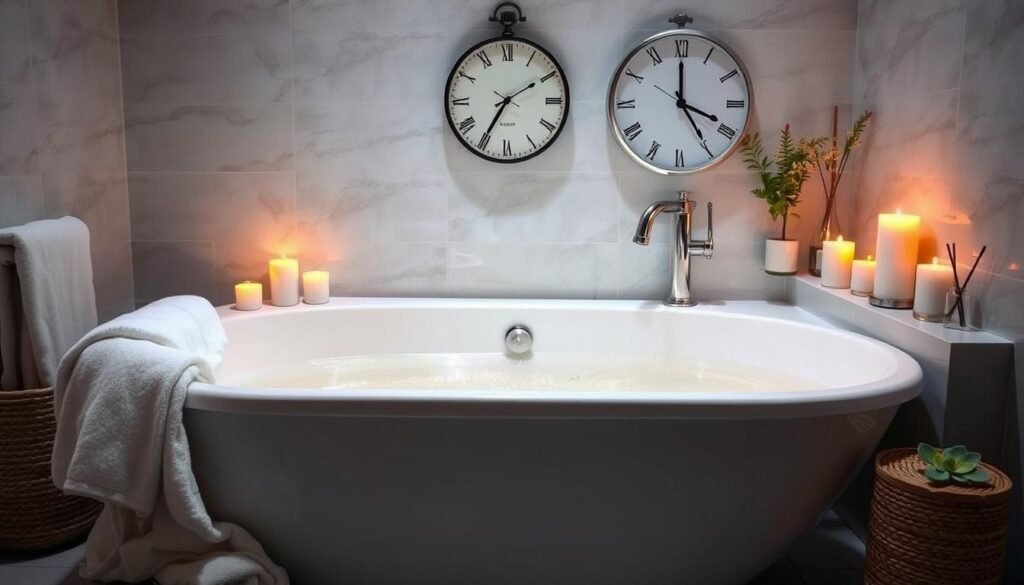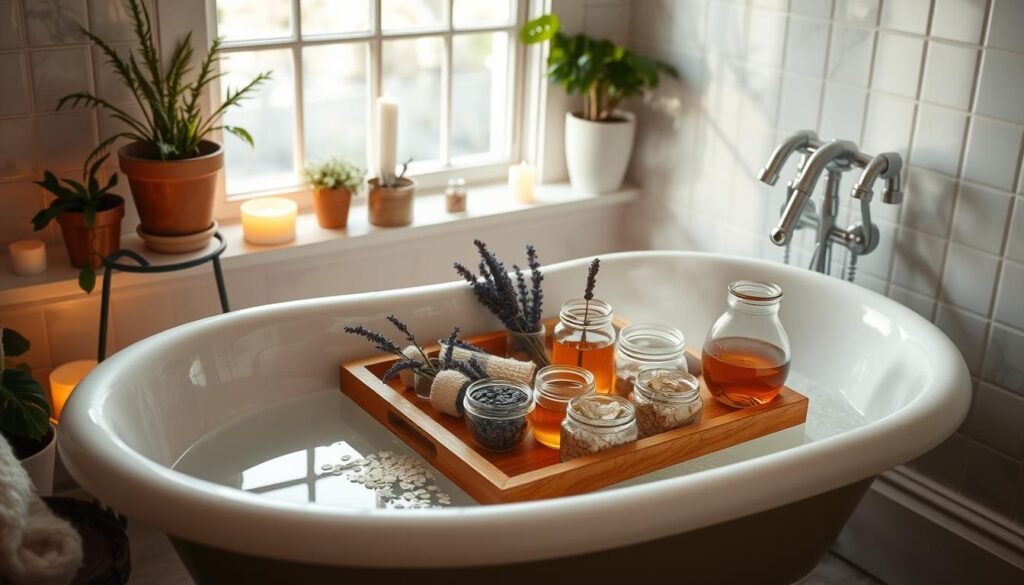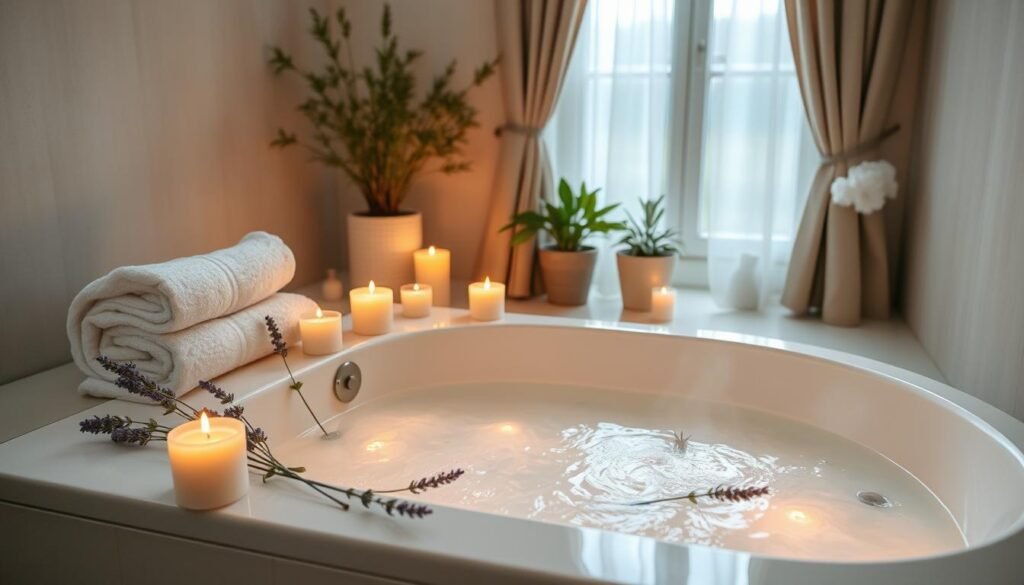Did you know about 10% of kids and 3% of adults in the U.S. have eczema? This skin issue can make life tough, messing with daily stuff and how you feel overall. Taking baths the right way can help stop eczema from getting worse. Having a smart bath routine is good for your skin and can cut down on the itchiness and irritation eczema brings. We’ll dive into different ways and steps to keep your skin healthy and manage eczema better in this article.
Key Takeaways
- Eczema impacts a lot of people, showing the need to handle it well.
- Cool bathing methods can really help lessen eczema issues.
- It’s crucial to stay clean for your skin’s sake.
- A steady bathing schedule can make a big difference for eczema sufferers.
- We’ll share special tips to make bathing better throughout this article.
Understanding Eczema and Its Triggers
Eczema is a chronic skin condition that causes itchy and dry skin. Knowing the eczema triggers is key to control it. Many things can make it worse, so it’s important to know what bothers your skin.
Common Causes of Eczema Flare-Ups
There are several causes of eczema flare-ups. Here are some common ones:
- Environmental allergens like pollen and dust mites.
- Skin irritants such as harsh soaps, detergents, and certain fabrics.
- Emotional stress, which can make symptoms worse.
- Changes in weather, especially dry or cold conditions.
Knowing what triggers your eczema helps you avoid them and manage your symptoms better.
The Role of Personal Hygiene in Skin Health
Personal hygiene matters a lot in keeping skin healthy, especially with eczema. Not cleaning your skin well can make irritation worse. It’s important to use gentle cleansers and not wash too much, to avoid drying out your skin. Moisturizing after bathing helps improve skin condition and supports good skin care.
Importance of Gentle Bathing Practices
Gentle bathing is key for keeping skin healthy, especially if you have eczema. Picking the right products helps avoid irritation and keeps skin moist. Knowing about different soaps and cleansers is important to keep skin in good shape.
Why Avoid Harsh Soaps and Fragrances?
Harsh soaps and fragrances use synthetic stuff that can remove your skin’s natural oils. This can make your skin dry, irritated, and could cause eczema to get worse. Most commercial soaps don’t keep your skin moist, making it more delicate. It’s better to stay away from these harsh products to care for your skin properly.
Benefits of pH-Balanced Cleansers
Using pH-balanced cleansers is very beneficial for your skin. These cleansers keep your skin’s natural barrier strong, hold in moisture, and lessen the chance of irritation. Brands like Cetaphil and Dove make these kinds of cleansers for sensitive skin. Using them regularly can make your skin healthier and tougher.
| Type of Product | Characteristics | Examples |
|---|---|---|
| Harsh Soaps | Strips natural oils, potential irritants | Commercial bar soaps |
| pH-Balanced Cleansers | Maintains moisture, gentle on skin | Cetaphil, Dove |
Ideal Water Temperature for Bathing
Choosing the right water temperature is key for eczema relief. Hot water can dry out the skin. This can make eczema worse. It’s important to understand how temperature affects skin health. This helps create a better bathing experience.
How Hot Water Affects Eczema
Hot water may seem soothing, but it removes natural oils from the skin. This can make eczema flare-up. Research shows too hot water dries out the skin fast. This makes what could be a soothing bath painful. Keeping the water warm, not hot, prevents these issues.
Finding the Right Temperature for Comfort
Experts suggest bathing in lukewarm water, between 32°C and 40°C (90°F to 105°F). This temperature is warm but doesn’t harm the skin. For a safer bath, thermostatic mixing valves regulate water temperature. This helps you enjoy a bath without harming your skin.
Right water temperature boosts comfort and helps keep the skin hydrated. This is important for those with eczema. For more tips on the perfect bath temperature, check out this comprehensive resource.
| Water Temperature | Recommended for Eczema | Possible Effects |
|---|---|---|
| Below 32°C (90°F) | Safe & soothing | Less irritation |
| 32°C – 40°C (90°F – 105°F) | Ideal | Comfort & hydration |
| Above 40°C (105°F) | Not recommended | Increased dryness & irritation |
Bathing Frequency and Timing
Finding the right schedule for bathing when you have eczema is important. Bathing daily can keep your skin clean and moist, which is key for taking care of it. But, it’s also important not to bathe too much. Too many baths can make your skin dry and work against you.
How Often Should One Bathe?
How often you should bathe can be different for each person. For many with eczema, cleaning up once a day is good. Baths help get rid of things that can irritate your skin. Always pay attention to how your skin reacts after a bath. You might need to change your routine if your skin doesn’t like it.
Best Times of Day for Bathing
When you bathe can also affect your skin care plan. Taking a bath in the evening is often the best choice. It helps you relax before bed and lets your skin soak up moisture. This is a good time to use moisturizers. They can do their job better overnight while your body rests.

Effective Shower Routine for Eczema Relief
Creating a good shower routine can really help with eczema. It’s all about a gentle approach that keeps skin hydrated and comfy.
Steps to a Gentle Shower Experience
Starting with lukewarm water is key. It’s gentle on the skin and doesn’t cause dryness. Next, choose a mild shower cleanser. Look for pH-balanced ones that clean well but are kind on your skin. Brands like Cetaphil or Dove have great options for sensitive skin.
Incorporating Moisturizers Post-Shower
Moisturizing right after showering locks in moisture, crucial for eczema sufferers. Use thick creams like Aquaphor or Eucerin for extra hydration. They form a protective layer that fights off flare-ups. For more tips on bathing with eczema, check out this resource.
Natural Remedies to Enhance Your Bathing Rituals
Adding natural remedies to your bath can make relaxation better. It also helps relieve eczema discomfort. Things like oatmeal baths and essential oils can soothe the skin. They also improve overall well-being.
Using Oatmeal Baths for Soothing Relief
Oatmeal baths are great for soothing the skin. They are especially helpful for those with itchy or inflamed skin from eczema. Calming irritated skin and making a protective layer is what colloidal oatmeal does best. Just add finely ground oatmeal to warm bathwater. This lets your skin soak up all the good stuff.
Essential Oils and Aromatherapy Benefits
Lavender and chamomile oils make baths better. They offer a nice smell and health benefits. These oils can lower stress and help you relax. They also fight inflammation and are good for your skin. A few drops of these oils in your bath can provide aromatherapy advantages. It fits well with self-care ideas from this resource.

| Natural Remedy | Benefits |
|---|---|
| Oatmeal Baths | Soothes irritation, moisturizes skin, relieves itchiness |
| Lavender Essential Oil | Reduces stress, promotes relaxation, anti-inflammatory |
| Chamomile Essential Oil | Calms skin, reduces redness, provides relaxation |
Water Conservation Tips while Bathing
Saving water is good for the planet and our skin. When we bathe the eco-friendly way, we use less water. This helps make our bathrooms sustainable.
Saving Water Without Sacrificing Care
You can save water in the bathroom and still take good care of your skin. Here are easy ways to do it:
- Take shorter showers, aiming for 5 to 10 minutes.
- Turn off the water while lathering up with soap or shampoo.
- Install water-efficient showerheads to minimize flow rate.
- Use a bucket to catch excess water during showering, which can be repurposed for flushing toilets.
- Limit the frequency of baths, opting for showers instead when feasible.
Eco-Friendly Products to Consider
Picking eco-friendly products helps save water and is better for your skin. Check out these options:
| Product Type | Benefits | Examples |
|---|---|---|
| Biodegradable Soaps | Break down safely in water. | Dr. Bronner’s Castile Soap |
| Eco-Friendly Shampoos | Gentle on hair and the environment. | Ethique Solid Shampoo Bars |
| Reusable Bath Accessories | Reduce waste and save resources. | Loofah Sponges |
| Water-Efficient Bath Products | Designed to use less water without compromising quality. | Olay Body Wash with Water-Saving Formulation |
Creating a Soothing Bathing Environment
Making bath time soothing can really boost relaxation and skin health. It highlights the value of cleansing rituals for a calm atmosphere. With the right steps, your bath can become a healing journey.
Cleansing Rituals for Relaxation
Adding calming touches to your bath turns it into a spa moment. Think about:
- Using soft washcloths for gentle exfoliation
- Enjoying light aromatherapy with essential oils
- Soaking in warm water with lovely plants
These steps help melt away stress and care for your skin. For more ideas, check out this article on making bathing special.
Choosing the Right Bathing Accessories
Picking the right bathing accessories changes everything. Choose soft items if your skin gets upset easily. Here’s what we suggest:
- Gentle natural loofahs
- Soft, safe-to-use washcloths
- Aromatherapy diffusers for mood-setting

Creating a calm space with mindful cleansing rituals makes bathing wonderful. It helps your body and soul feel cared for.
Bathing Culture and its Influence on Skin Care
Bathing customs differ worldwide, showcasing each culture’s values and traditions. These rituals greatly affect skin care and overall health. Learning about various bathing methods can make our own practices more beneficial and enjoyable.
Global Bathing Practices for Skin Health
Different cultures see bathing as more than just cleaning. They view it as a therapeutic and rejuvenating activity. In Japan, soaking in hot springs relaxes the body and keeps the skin moist. Scandinavians combine the heat of saunas with cold plunges, boosting circulation.
This approach is known as hydrotherapy, and it’s great for skin care.
Lessons from Diverse Bathing Cultures
Adopting practices from various cultures can improve our skin care routines. Important takeaways include:
- Mindfulness: The act of being present during bathing helps with relaxation and reducing stress.
- Natural Ingredients: Many cultures use plants and natural oils in baths, proving their benefit for the skin.
- Community Engagement: In some places, bathing is a social event, adding a community feel to self-care.
By using these ideas, we can turn bathing into a rich experience that helps our skin and well-being.
Conclusion
Effective bathing habits are crucial in managing eczema. Using pH-balanced cleansers and lukewarm water helps reduce flare-ups. Avoid harsh soaps and try natural remedies, like oatmeal baths, for a soothing skin experience.
It’s important to know what triggers your eczema. Also, keep up with good hygiene. Don’t forget that when and how often you bathe matters too. These steps can help you maintain healthy skin and enjoy relaxing moments.
Choosing eco-friendly bathing options and creating a comfortable environment can boost your skin health. It can also improve your overall well-being. Stick to these practices for better eczema management and skin health.